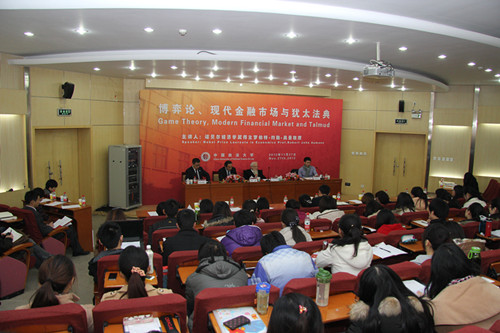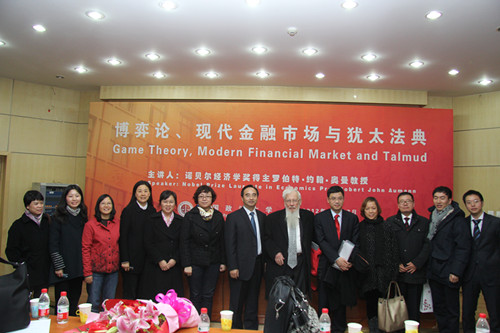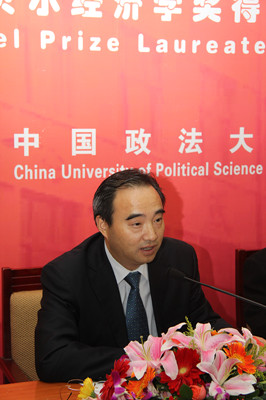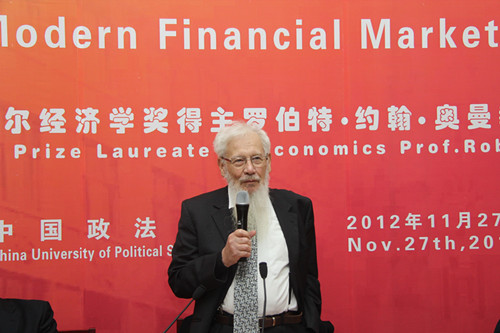

On the afternoon of November 27, 2012, at Xueyuan Lu Campus, the 2005 Nobel laureate in economics, Prof. Robert John Aumann from Israel's Hebrew University of Jerusalem, delivered a speech. The title of the speech was “Game Theory, Modern Financial Market and the Talmud”.

CUPL President Huang Jin expressed a warm welcome to Prof. Robert John Aumann. President Huang introduced the great achievements Prof. Aumann has made in economics, and sincerely expressed congratulations to Prof. Aumann for his latest appointment as an honorary professor at the University of International Business and Economics (UIBE), and as a special research fellow of UIBE’s China Jewish Economic and Cultural Research Center. Secondly, President Huang gave a brief introduction of CUPL's situation and its educational characteristics. President Huang emphasized the recently adopted talent cultivation mode, which is characterized by the combination of law and business management. He also stressed the educational achievements CUPL has attained by executing its internationalization strategy. Finally, President Huang hopes that, with the help of Prof. Aumann, three goals can be achieved: the promotion of cooperation between the Hebrew University of Jerusalem and CUPL; the promotion of exchanges between China’s legal studies circles and Israeli legal studies circles; the promotion of interest as well as the research in Jewish laws by China’s legal studies circles.

In his speech, Prof. Aumann said Game Theory can be applied in the judiciary. He presented plea bargaining as an example. In the 2000 year old Talmud, to minimize the occurrence of misjudged cases, suspects in murder cases were not allowed to make a confession. However, in order to maximize their benefits, contemporary plaintiffs and defendants propelled the creation of plea bargaining, but ultimately sunk into the so-called prisoner's dilemma. Currently, in the U.S., over 80% of criminal cases were closed by a plea bargaining. In Israel, that rate rose to over 90%. As for rape cases, plea bargaining was also very popular in the U.S. But later DNA testing showed that 25% of such cases turned out to be misjudged.
Apparently, it is hard for us to grasp the facts of a case by using plea bargaining. Once a conviction is proved to be wrongful , the government also had to pay a large amount of compensation. In modern criminal justice, plea bargaining, which only focuses on the consequence but not on process and fact-finding, is not in accord with the notions of criminal law. In addition, as for China's judiciary, Prof. Aumann believed that, in civil cases, large quantities of lawsuits were resolved by extra-judicial settlements. Those settlements are characterized with huge uncertainty. As for individuals who have limited financial resources, it is easier for them to use settlement to resolve their disputes. By comparison, due to their large financial resources and their risk bearing capacity, big enterprises would prefer to resolve their disputes by using adjudications.
In Q&A section, faculty members and students raised many questions, such as issues concerning environmental pollution, plea bargaining, the facts of cases, the nationalization of GM by the U.S. government, and the rationality of plea bargaining, etc. When answering the question concerning non-cooperative games and the resolution of international regional conflicts, Prof. Aumann said that, full preparations for war has to be done if we want to achieve peace, for, under that situation, no side would provoke war recklessly.
Associate prof. Hu Jiye of CUPL Research Center for Law and Economics presided over the speech. After the lecture, President Huang and Prof. Aumann exchanged gifts and took a group photo with faculty members and students.

